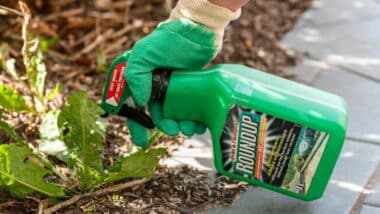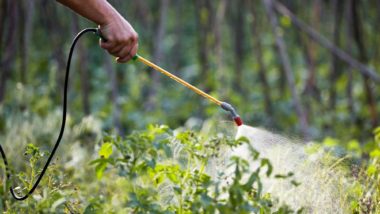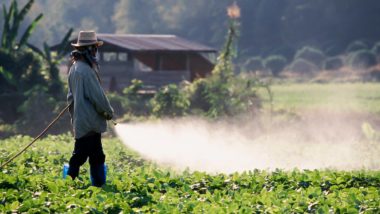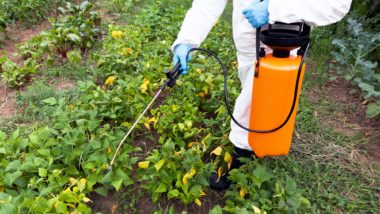Who’s Affected?
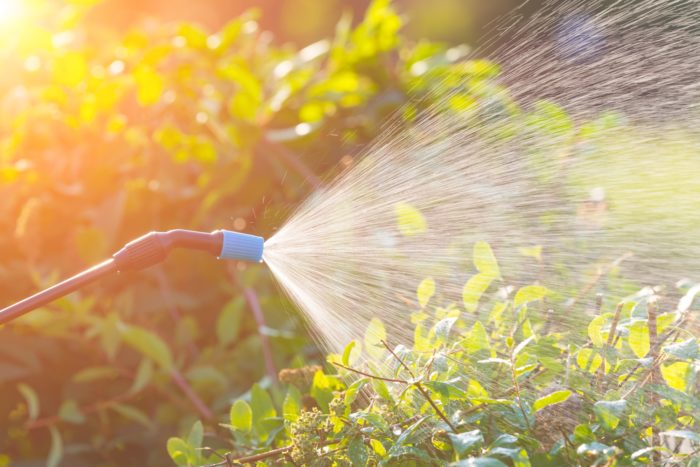
Are you a Canadian citizen who developed cancer after using the weedkiller Roundup?
Glyphosate is a widely used herbicide found in the popular weedkiller Roundup. This chemical is reportedly classified as a probable human carcinogen by an international cancer research group.
Using glyphosate over a long period of time can reportedly lead to the development of non-Hodgkin’s lymphoma, a type of cancer affecting the lymphatic system.
Canadian residents who developed non-Hodgkin’s lymphoma or another type of Roundup cancer may be eligible to take legal action against the manufacturer Monsanto, and its parent company, Bayer. Legal action could help those injured recover compensation for medical expenses, funeral costs, pain and suffering, and more.
If you are a Canadian citizen who developed cancer after using Roundup products, you may be eligible to join a FREE Canada Roundup cancer class action lawsuit investigation.
See if you qualify by filling out the form on this page for a free case evaluation by a Canadian Roundup lawyer.
What is Glyphosate?
Glyphosate is a non-selective herbicide used in common weed killers. Roundup and other industrial versions of the herbicide manufactured by Bayer subsidiary Monsanto are widely used around the Canada.
Glyphosate works to kill plants by targeting an enzyme pathway necessary for plant survival.
Does Roundup Cause Cancer?
Although glyphosate herbicides like Roundup are widely used, studies have revealed that they may cause cancer.
In March 2015, the World Health Organization’s International Agency for Research on Cancer (IARC) officially classified glyphosate as “probably carcinogenic to humans.”
The classification was reportedly based on “sufficient” evidence that the substance causes cancer in animals in addition to “limited” evidence of the same mechanism in humans.
Based on the Roundup cancer research available, the agency concluded that there was “strong” evidence that both “pure” glyphosate and glyphosate formulations lead to genotoxicity.
Regulators such as Health Canada have rejected this classification, placing them at odds a growing body of science and the international authority under the United Nations.
In 2017, Health Canada decided to approve the use of glyphosate for 15 years—a decision they reaffirmed in January 2019. Advocacy groups have called this decision “deeply flawed,” claiming that the regulator failed to consider all of the evidence when making the decision.
What Type of Cancer is Linked to Roundup?
Glyphosate is reportedly associated with an increased risk of developing non-Hodgkin’s lymphoma.
Non-Hodgkin’s lymphoma occurs in the lymphatic system, a widespread series of glands in the body that helps fight diseases. This type of cancer reportedly develops from a type of white blood cells known as lymphocytes.
Have Roundup Lawsuits Been Filed in Canada?
Consumers in Canada have begun to file lawsuit alleging that the glyphosate weedkiller Roundup cases cancer.
In July 2019, a woman from Ontario and man residing in Nova Scotia filed a national class action lawsuit against Monsanto and Bayer.
The claim describes that the man was routinely exposed to Roundup during his work on various farms from 1988 until 2011. In 2014, he was diagnosed with Waldenstrom’s Macroglobulinemia, a type of non-Hodgkin’s lymphoma.
The woman used Roundup seasonally on her farm from 2007 until 2013. She was diagnosed with Mantle cell lymphoma, a type of non-Hodgkin’s lymphoma, in 2014 and continues to receive treatment through ongoing clinical drug trials.
Both plaintiffs were exposed to glyphosate in various ways: their skin and on their clothing, and via inhalation during spraying. Neither knew that using and/or being exposed to Roundup as intended could cause them harm.
The Roundup cancer lawsuit claims that Monsanto and Bayer were negligent in their design, development and testing on Roundup and its marketing and sale. It is alleged that they chose not to warn consumers that glyphosate is associated with an increased risk of cancer, instead misrepresenting the Roundup products as safe. The lawsuit also claims that Monsanto and Bayer created a dangerous and unreasonable risk of harm to individuals who use and/or are exposed to Roundup.
The action seeks damages, including for personal injuries, mental anguish and severe emotional distress associated with the personal injury, pain and suffering, diminished enjoyment of life, loss of employment income and benefits, possible death, and for expenses, including but not limited to cost of care arising from the need for lifelong medical treatment.
Lawsuits with similar allegations have been filed in various provinces across Canada, including Quebec, Manitoba, Ontario and British Columbia.
Should I File a Roundup Cancer Lawsuit?
Consumers in Canada who used Roundup and later developed non-Hodgkin’s lymphoma may be eligible to take legal action against the herbicide manufacturers.
Filing a Roundup cancer lawsuit could help sick consumers recover significant compensation for their cancers. Any resulting Roundup cancer lawsuit settlements could also help the family of injured or deceased consumers pay for treatment or funeral expenses, along with emotional damages from losing a loved one.
What Roundup Cancer Lawsuit Settlements Have Been Reached?
No Roundup cancer lawsuit settlements have been reached in Canada at this time, but plaintiffs in the United States have been successful in recovering millions of dollars in compensation.
In August 2018, the first Roundup glyphosate cancer award was granted by a California jury in the amount of $289 million. The Roundup lawsuit payout was awarded to a groundskeeper who allegedly developed terminal non-Hodgkin’s lymphoma due to exposure to glyphosate.
In May 2019, a jury awarded a couple $2.06 billion to compensate them for each of their non-Hodgkin’s lymphoma diagnoses. Although this award was later reduced, the couple still walked away with an award of $86.7 million.
While the legal systems in Canada and the United States are distinct – especially regarding the amount of damages that can be awarded – these cases show that legal success is possible and has been achieved against herbicide giants Monsanto and Bayer.
Join a Canada Roundup Cancer Class Action Lawsuit Investigation
If you or a loved one lives in Canada and developed cancer after using Roundup glyphosate products, you may be eligible to join a Canada Roundup cancer class action lawsuit investigation for FREE.
Fill out the form on this page for more information.
Get Help – It’s Free
Join a Free Canadian Roundup Glyphosate Cancer Class Action Investigation
U.S. citizens, click here for the U.S. Roundup Cancer Investigation.
If you qualify, a lawyer will contact you to discuss the details of your potential case at no charge to you.
PLEASE NOTE: If you want to participate in this investigation, it is recommended that you reply to the law firm if they call or email you.
E-mail any problems with this form to:
[email protected].
Oops! We could not locate your form.
After you fill out the form, the lawyers who work with Top Class Actions will contact you if you qualify to let you know if an individual lawsuit or class action lawsuit is best for you.
LAWYER ADVERTISING
The choice of a lawyer is an important decision and should not be based solely on advertisements.
Your information will be sent to attorneys working with Top Class Actions.
PAID LAWYER ADVERTISEMENT: THIS WEB PAGE IS AN ADVERTISEMENT AND THE PARTICIPATING LAWYER(S) ARE INCLUDED BECAUSE THEY PAY AN ADVERTISING FEE. Top Class Actions is not a law firm, lawyer referral service, or prepaid legal services plan. We do not endorse or recommend any third-party claims processing company, lawyer, or law firm who participates in the network. We do not make any representation, and have not made any judgment, as to the qualifications, expertise, or credentials of any participating lawyer or processing group. No representation is made that the quality of the legal services or claims processing to be performed is greater than the quality of legal services or claims processing performed by other lawyers or claims processing group. The information contained herein is not legal advice. Any information you submit to Top Class Actions does not create an lawyer-client relationship and might not be protected by lawyer-client privilege. Instead, your information will be forwarded to an lawyer or claims processing firm for the purpose of a confidential review and potential representation. You should not use this website to submit time-sensitive, or privileged information. All photos contained on this website are of models and do not depict clients.
ATTORNEY ADVERTISING
Top Class Actions is a Proud Member of the American Bar Association
LEGAL INFORMATION IS NOT LEGAL ADVICE
Top Class Actions Legal Statement
©2008 – 2026 Top Class Actions® LLC
Various Trademarks held by their respective owners
This website is not intended for viewing or usage by European Union citizens.

